仁爱版七年级英语下册unit5topic3教材讲解
仁爱英语七下教案Unit5Topic3.docx
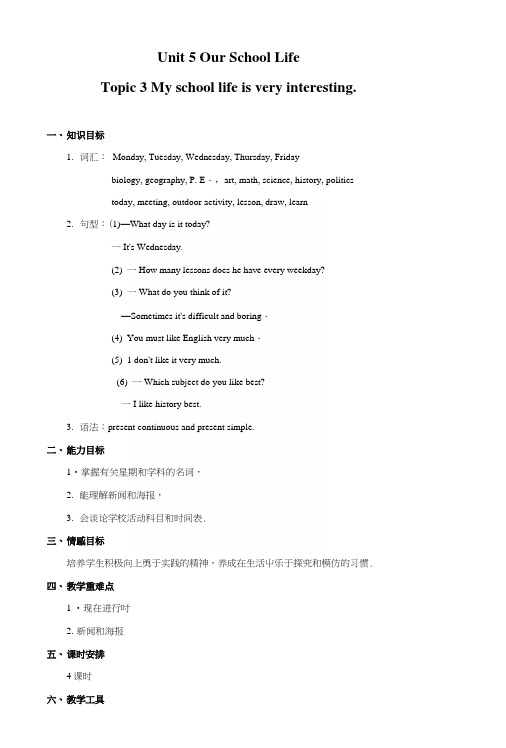
Unit 5 Our School LifeTopic 3 My school life is very interesting.一、知识目标1.词汇:Monday, Tuesday, Wednesday, Thursday, Fridaybiology, geography, P. E・,art, math, science, history, politicstoday, meeting, outdoor activity, lesson, draw, learn2.句型:(1)—What day is it today?一It's Wednesday.(2)一How many lessons docs he have every weekday?(3)一What do you think of it?—Sometimes it's difficult and boring・(4)You must like English very much・(5)1 don't like it very much.(6)一Which subject do you like best?一I like history best.3.语法:present continuous and present simple.二、能力目标1•掌握有关星期和学科的名词,2.能理解新闻和海报,3.会谈论学校活动科目和时间表.三、情感目标培养学生积极向上勇于实践的精神,养成在生活屮乐于探究和模仿的习惯.四、教学重难点1 •现在进行吋2.新闻和海报五、课时安排4课时六、教学工具三用机/卡片/挂图七、教学过程Section A—、知识目标1.词汇:Monday, Tuesday, Wednesday, Thursday, Fridaybiology, geography, P. E., art, math, science, history, politicstoday, meeting, outdoor activity, lesson, draw, learn2.句型:(1)一What day is it today?一I('s Wednesday.(2)…What time is it over?■一At a quarter to eleven.3.语法:present continuous and present simple.二、能力目标1•掌握有关星期和学科的名词,2.会谈论学校活动科H和时间表.三、情感目标培养学生积极向上勇于实践的梢神,养成在牛.活中乐于探究和模仿的习惯.四、教学重难点会谈论学校活动科目和吋间表.五、课时安排1课时六、教学工具三用机/卡片/挂图七、教学过程Step 1 ReviewReview the present continuous tense by asking and answering between the teacher and students oStep 2 Presentation1.T: Listen to la carefully and find out the answers to these questions(课堂思考1).(1)What day is it today?(2)What time does the class begin?(3)What time is it over?2.Check the answers.3.Read after la then find out the key point.(检查课前预习)4・ Look at the pictures and information in lb, and make similar conversations according to la.Step 3 ConsolidationL Fnish la and lb.2.Check the answers・Step 4 Practice1.A: What^s this? Do you know?B: 课程表。
最新(仁爱版)七年级下册Unit5topic3知识全解
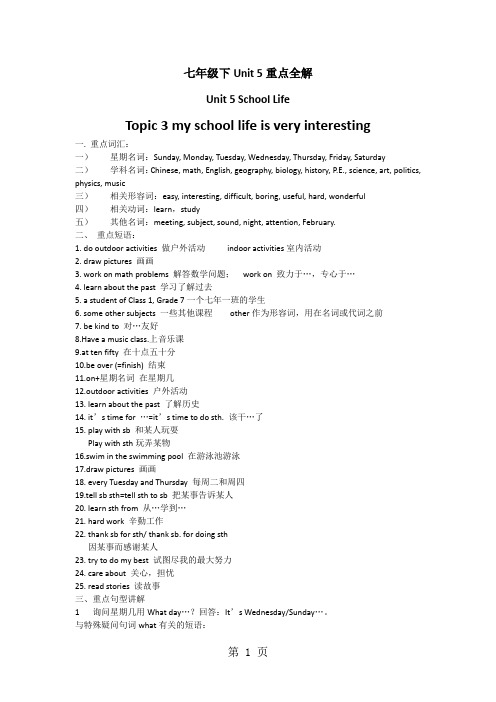
七年级下Unit 5重点全解Unit 5 School LifeTopic 3 my school life is very interesting一. 重点词汇:一)星期名词:Sunday, Monday, Tuesday, Wednesday, Thursday, Friday, Saturday二)学科名词:Chinese, math, English, geography, biology, history, P.E., science, art, politics, physics, music三)相关形容词:easy, interesting, difficult, boring, useful, hard, wonderful四)相关动词:learn,study五)其他名词:meeting, subject, sound, night, attention, February.二、重点短语:1. do outdoor activities 做户外活动indoor activities室内活动2. draw pictures 画画3. work on math problems 解答数学问题;work on 致力于…,专心于…4. learn about the past 学习了解过去5. a student of Class 1, Grade 7一个七年一班的学生6. some other subjects 一些其他课程other作为形容词,用在名词或代词之前7. be kind to 对…友好8.Have a music class.上音乐课9.at ten fifty 在十点五十分10.be over (=finish) 结束11.on+星期名词在星期几12.outdoor activities 户外活动13. learn about the past 了解历史14. it’s time for …=it’s time to do sth. 该干…了15. play with sb 和某人玩耍Play with sth玩弄某物16.swim in the swimming pool 在游泳池游泳17.draw pictures 画画18. every Tuesday and Thursday 每周二和周四19.tell sb sth=tell sth to sb 把某事告诉某人20. learn sth from 从…学到…21. hard work 辛勤工作22. thank sb for sth/ thank sb. for doing sth因某事而感谢某人23. try to do my best 试图尽我的最大努力24. care about 关心,担忧25. read stories 读故事三、重点句型讲解1 询问星期几用What day…?回答:It’s Wednesday/Sunday…。
七年级下册英语课件 Unit5_Topic3_SectionC_精品课件
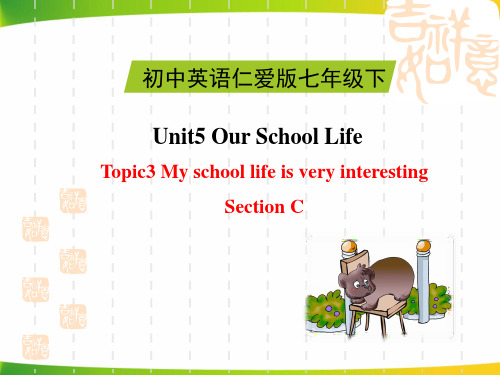
1. Hu Bin likes his school life a lot. True False
2. Hu Bin likes math best.
True False
3. Hu Bin has six classes every weekday.
True False 4. Swimming is his favorite outdoor
P21 1a 5幅图
stamp
Stamp Show
2. Read the news and posters and pay attention to the formats of news and posters.
P22 2 三幅图
Read the news and posters to learn about Hu Bin’s interesting school life. Then answer the following questions.
It's ... I like ... best. Because it's ... What do you think of it? At 8:00.
Presentation Answer the questions:
What subjects do you study in the school?
activity.
True False
Read 1a again and fill in the blanks.
Hu Bin is a student of Class 1, Grade 7. His school life is very i_n_t_e_re_s_t_in_g_. Classes _b_e_g_in___ at 8:00 a.m. He _s_tu_d__ie_s_ Chinese, English, politics and some other subjects. He _l_ik_e_s__ English best. But he _d_o_e_sn__’t__ _l_ik_e__ math very much. He _t_h_in_k_s_ it’s a little difficult and boring. After school, he often _p_la_y_s_ basketball with his classmates. It’s his favorite outdoor activity.
仁爱英语七下Unit5Topic3SectionA课件
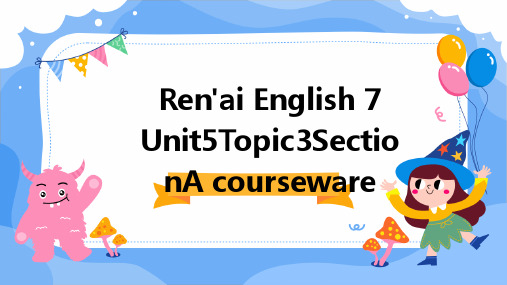
Key vocabulary and phrase explanations
Key Vocabulary
Effective communication : The ability to communicate clearly and honestly with your partner
Healthy romantic relationship : a relationship that is emotionally and physically satisfying for both partners
Overview of teaching content
Unit 4
Business English - prepare learners for the language demands of the workplace, covering areas such as emails, reports, meetings, and negotiations
Arranging grammar points in a logical order to facilitate learning and understanding
Example of using grammar points
Giving examples of real life situations where the grammar point can be applied
It focuses on enhancing learners' ability to communicate effectively in English through a variety of speaking, listening, reading, and writing activities
【教案】仁爱版七年级下册Unit 5 Topic 3 教案
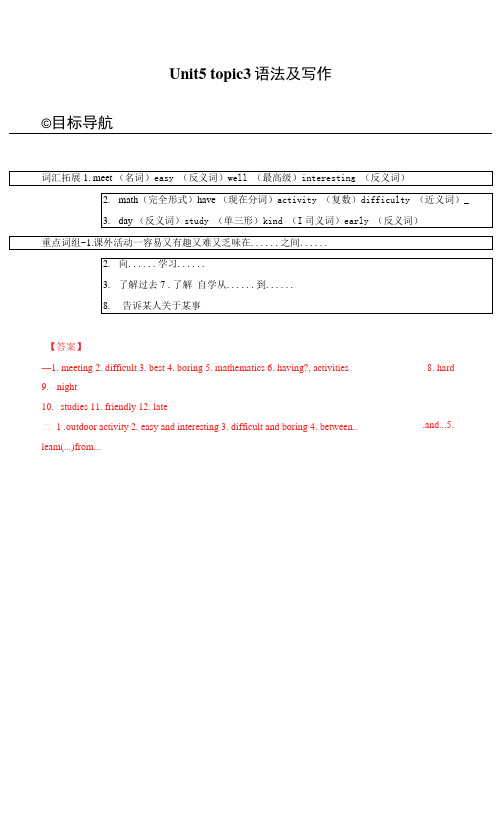
Unit5 topic3语法及写作©目标导航【答案】—1. meeting 2. difficult 3. best 4. boring 5. mathematics 6. having?, activities9.night10.studies 11. friendly 12. late二 1 .outdoor activity 2. easy and interesting 3. difficult and boring 4. between.. leam(...)from...8. hard .and...5.6.learn about the past7. learn about8. learn by oneselfP. from...to... 10. tell sb. about sth语法mustn't 一May I take the magazine out of the reading room?2. —Whose cap is this? Is it Cindy's? be hers. Don't you remember she even didivt come to the parly?3.—Will you slay here for dinner with us? My mother is waiting for me at home.be6.—Where is Monica? I can't find her anywhere.be in the library. She loves reading books when she is free.8. Ants are pretty small. You might think that they might not know is that ants are actually very strong for their size.考查情态动词辨析。
知识点七年级英语(仁爱版)(下册)Unit-5-Topic-3语言点归纳
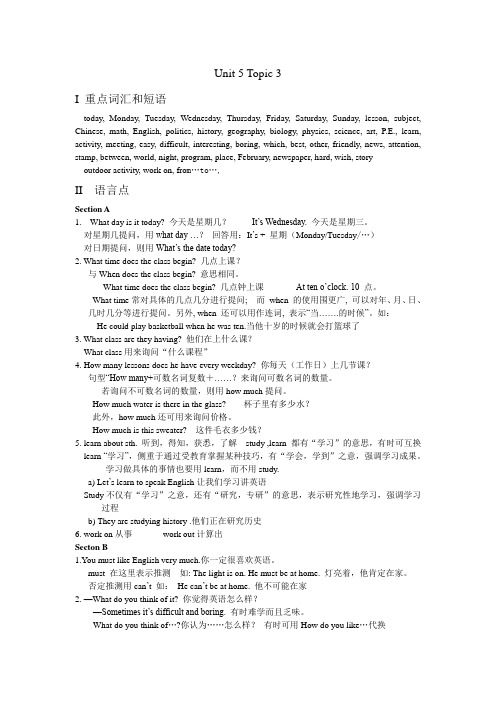
Unit 5 Topic 3I 重点词汇和短语today, Monday, Tuesday, Wednesday, Thursday, Friday, Saturday, Sunday, lesson, subject, Chinese, math, English, politics, history, geography, biology, physics, science, art, P.E., learn, activity, meeting, easy, difficult, interesting, boring, which, best, other, friendly, news, attention, stamp, between, world, night, program, place, February, newspaper, hard, wish, storyoutdoor activity, work on, fro m…to…,II 语言点Section A1.---What day is it today? 今天是星期几?---It’s Wednesday. 今天是星期三。
对星期几提问,用what day …?回答用:It’s + 星期(Monday/Tuesday/…)对日期提问,则用What’s the date today?2. What time does the class begin? 几点上课?与When does the class begin? 意思相同。
--- What time does the class begin? 几点钟上课--- At ten o’clock. 10 点。
What time常对具体的几点几分进行提问; 而when 的使用围更广, 可以对年、月、日、几时几分等进行提问。
另外, when 还可以用作连词, 表示“当…….的时候”。
仁爱版七年级英语下册教案Unit5Topic3SD教案

But ____ she plays with her little brother.
通过学习P23- 24的生词,让学生并能熟练说出、写出P23- 24的生词,并能进行英汉互译。
1 I like reading it with my friends.
C. My school life is very interesting. D. I think my school life is difficult.
( )6.—_____ do you like science?
—Because it’s interesting.
A. WhatB. WhenC. WhichD. Why
hard work 努力工作
Thank you for
=Thanks for + 动词ing / 名词
like + ving
学习目标
教学活动
评价要点
要点归纳
目标2复习并掌握现在进行时
Step4【自学指导2】
自学内容:课本P17—22
自学方法:根据汉语找出句子。
自学时间:5分钟
自学要求:会背,会运用.
Step5【自学检测2】汉译英。
1他们正在上什么课?
2下节课几点开始?
3他每周上几节英语课?
4我的学校生活是非常有趣的。
2、针对目标2,通过熟读2,掌握重点句型。
四、教学过程
学习目标
教学活动
评价要点
要点归纳
目标1:学
习并能
说出、
写出P2自学内容:课本3页—4页的频率副词。
2.自学方法:先背,同桌互相提问。
仁爱版英语七年级下册Unit5 Topic3 语法精讲:现在进行时

语法精讲:现在进行时1. 现在进行时的构成:Am/is/ are+ v-ing是现在进行时的构成形式v-ing现在分词的构成:一般情况+ing falling以不发音字母e结尾的单词去e, +ing having双写词尾字母+ing putting 以重读闭音节结尾的单词,末尾只有一个辅音字母时.2. 现在进行时的基本用法1) 表示说话时正在进行的动作常和now连用,有时用一个动词如look(看)、listen(听)来表示now(现在)这一时间概念。
Look! A train is coming.看!火车来了Listen! He is playing the piano.听!他在弹钢琴。
2) 表示现阶段正在进行着的动作但不一定是说话时正在进行。
常和at present(目前)、this week(本周)、these days(这几天)等时间状语连用。
What lesson are you studying this week?你们本周学哪一课了?(说话时并不在学)3) 现在进行时有时可用来表示一个在最近按计划或安排要进行的动作即是说可以用来代替将来时,但此时,一般要与表示将来的时间状语连用,而且仅限于少量动词。
如:go(去)、come(来)、leave(离开)、start(开始)、arrive(到达)、return(返回)、sleep(睡觉)……Are you going to Tianjing tomorrow?你明天去天津吗?How many of you are Coming to the party next week?你们有多少人下周要来参加晚会?4) be going to+动词原形这一句型表示即将发生的事或打算(准备)做的事,我们把它归在将来时里了。
(详见第十章将来时)She isn't going to speak at the meeting. 她不打算在会议上发言。
注意:如果没有表示将来时间的状语,此类句子就可能指现在或现阶段的动作。
仁爱版七年级英语下册Unit 5 topic3 section C课件(共23张PPT )
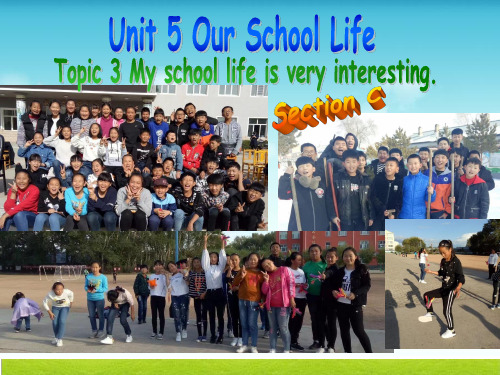
Read the news and posters and pay attention to their formats.
P22 2 三幅图
Read the news and posters to learn about Hu Bin’s interesting school life. Then answer the following questions.
2. Are his teachers and classmates kind to him? Yes, they are .
3.What about his school life? It is very interesting .
4.Does he like his school life? Yes , he does.
1a. Read the passage and check ylikes his school life a lot.
True False
2. Hu Bin likes math best.
True False
3. Hu Bin has six classes every weekday. True False
1. Hu Bin likes his school life a lot.
True False
2. Hu Bin likes math best.
True False
3. Hu Bin has six classes every weekday. True False
4. Swimming is his favorite outdoor activity. True False
Read the news and posters again, and then fill in the blanks.
七年级英语下册 Unit5 topic 3知识点 仁爱版
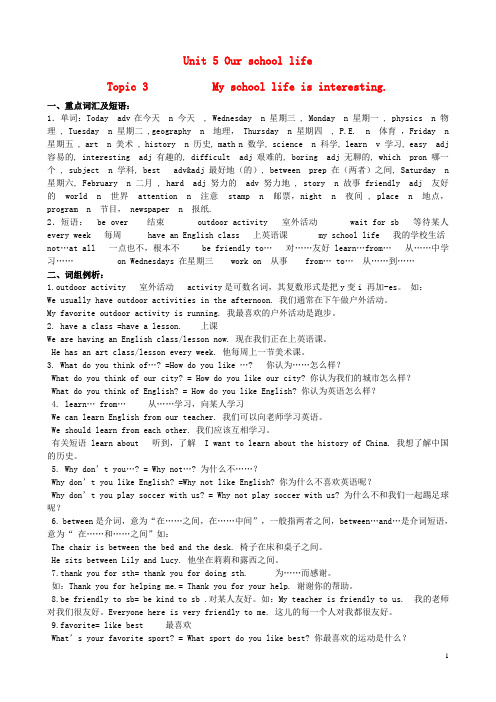
Unit 5 Our school lifeTopic 3 My school life is interesting.一、重点词汇及短语:1.单词:Today adv在今天 n 今天 , Wednesday n 星期三 , Monday n 星期一 , physics n 物理 , Tuesday n 星期二 ,geography n 地理, Thursday n 星期四 , P.E. n 体育,Friday n 星期五 , art n 美术 , history n 历史, math n 数学, science n 科学, learn v 学习, easy adj 容易的, interesting adj 有趣的, difficult adj 艰难的, boring adj 无聊的, which pron 哪一个 , subject n 学科, best adv&adj 最好地(的), between prep 在(两者)之间, Saturday n 星期六, February n 二月 , hard adj 努力的 adv 努力地 , story n 故事 friendly adj 友好的 world n 世界 attention n 注意 stamp n 邮票,night n 夜间 , place n 地点,program n 节目, newspaper n 报纸.2.短语: be over 结束 outdoor activity 室外活动 wait for sb 等待某人every week 每周 have an English class 上英语课 my school life 我的学校生活not…at all 一点也不,根本不be friendly to… 对……友好learn…from… 从……中学习…… on Wednesdays 在星期三 work on 从事from… to… 从……到……二、词组例析:1.outdoor activity 室外活动 activity是可数名词,其复数形式是把y变i 再加-es。
仁爱版七年级英语下册优秀教学案例:Unit5Topic3SectionC

1.情境创设:本节课通过展示野生动物的图片、视频等资料,生动形象地展现了野生动物的生存现状,使学生能够身临其境地感受野生动物的生活,引发他们的共鸣,提高了学生的学习兴趣。
2.问题导向:教师设计了一系列问题,引导学生进行思考和讨论,激发了学生的探究欲望,培养了他们的思维能力,使学生在思考中掌握了知识。
3.小组合作:教师组织了学生进行小组合作,让学生在讨论和互动中,共同完成学习任务,培养了学生的团队合作精神和交流沟通能力。
4.教学策略灵活多样:教师结合教学内容,采用了情景创设、问题导向、小组合作等多种教学策略,使学生在实践中学习,提高了学习效果。
5.注重学生个体差异:教师关注学生的个体差异,给予他们个性化的指导和帮助,确保每个学生都能在课堂上得到有效的学习,提高了学生的学习自信心。
(三)情感态度与价值观
在本节课中,学生需要培养以下情感态度和价值观:
1.培养学生对野生动物的关爱之情,提高他们的环保意识。
2.培养学生尊重和保护野生动物的价值观,增强他们的社会责任感。
3.培养学生积极乐观的人生态度,鼓励他们主动参与社会公益活动。
为了达到以上情感态度与价值观目标,我将结合教学内容,设计相关的讨论和实践活动,让学生在参与中体验,从而培养他们的情感态度和价值观。
(五)作业小结
在课堂即将结束时,我会布置一份相关的作业,让学生课后进行练习。例如,我会让他们一篇关于野生动物保护的短文,或者绘制一幅关于野生动物的图画。通过作业小结,让学生在课后巩固所学知识,提高他们的实践能力。
整个教学过程的设计,我将注重学生的参与和互动,让他们在实践中学习,提高他们的学习兴趣和学习效果。同时,我还会关注学生的个体差异,给予他们个性化的指导和帮助,确保每个学生都能在课堂上得到有效的学习。
仁爱版英语七年级下册Unit5 Topic3_SectionC教材知识详解

Topic3 SectionC教材知识详解1.At school, my teachers and classmates are very kind to me.在学校,我的老师和同学对我很友好。
be kind to sb.对某人友好。
如:Everyone here is very kind to us.这里的每个人对我们都很友好。
kind形容词,意为“友好的;善良的,可亲的”,与friendly接近。
如:My classmates are always friendly to me.我的同学一直对我很友好。
2.I study Chinese, English, math, politics, art, history, geography, biology and some other subjects.我学习语文、英语、数学、政治、美术、历史、地理、生物和一些其他的课程。
(1)study和learn都表示“学习”,指在学校学习各门功课时,二者可以互换,但它们也有区别:①learn是通过练习或教师指导而记住或学会,是初步学习或模仿式学习;study 指“用功学,钻研,研究”。
如:I’m learning to skate.我在学滑冰。
②当表示“向某人学习,从……中学习”时,只用learn不用study。
如:We should learn from each other.我们应该互相学习。
③教与学并提时,只用learn,不用study。
如:Men learn while they teach.教学相长。
(2)other是形容词,意为“另外的,其他的”,表示泛指时,常与复数名词或不可数名词连用。
如:I see John with some other boys.我看见约翰和其他一些男孩子在一起。
此外,如果其前有the, this, any, each, every, no, none以及形容词性物主代词时,其后只可接单数名词。
仁爱版七下英语Unit 5 Topic 3 SectionD 课件

Listen to the conversations and complete the table.
Name Day Activity Place have a P.E. class playground /play soccer
Kangkang Wednesday Maria
Li Yang Ellen Monday Sunday Friday
I usually do my homework after supper. When I study English, I never listen to English CDs. Sometimes I use a dictionary to learn new English words. I also always study English grammar. But I seldom speak English after class. I really should speak English more often. I usually read English stories every week, and I always write new sentences every day.
Present Continuous
I am reading an English book. The boy is drawing pictures. He isn’t cleaning the blackboard. They are having a music class.
Functions
It's ... I usually ... We are having ... I like ... best. Because it's ... What do you think of it? At ... At ...
仁爱版英语七年级下册Unit5_Topic3_SectionD_精品教案
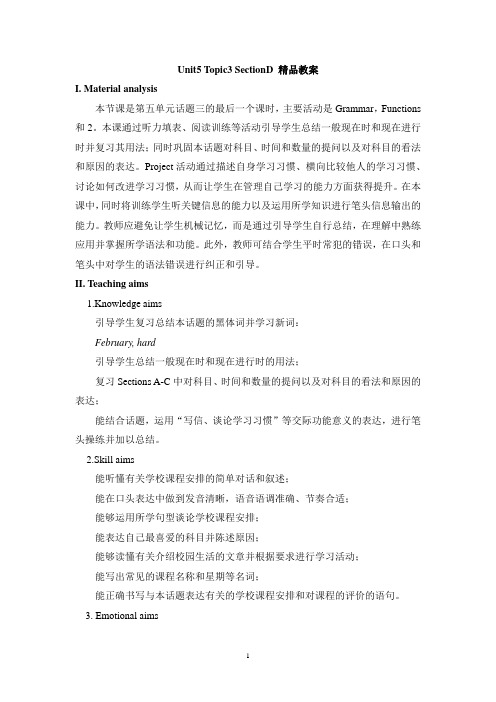
Unit5 Topic3 SectionD 精品教案I. Material analysis本节课是第五单元话题三的最后一个课时,主要活动是Grammar,Functions 和2。
本课通过听力填表、阅读训练等活动引导学生总结一般现在时和现在进行时并复习其用法;同时巩固本话题对科目、时间和数量的提问以及对科目的看法和原因的表达。
Project活动通过描述自身学习习惯、横向比较他人的学习习惯、讨论如何改进学习习惯,从而让学生在管理自己学习的能力方面获得提升。
在本课中,同时将训练学生听关键信息的能力以及运用所学知识进行笔头信息输出的能力。
教师应避免让学生机械记忆,而是通过引导学生自行总结,在理解中熟练应用并掌握所学语法和功能。
此外,教师可结合学生平时常犯的错误,在口头和笔头中对学生的语法错误进行纠正和引导。
II. Teaching aims1.Knowledge aims引导学生复习总结本话题的黑体词并学习新词:February, hard引导学生总结一般现在时和现在进行时的用法;复习Sections A-C中对科目、时间和数量的提问以及对科目的看法和原因的表达;能结合话题,运用“写信、谈论学习习惯”等交际功能意义的表达,进行笔头操练并加以总结。
2.Skill aims能听懂有关学校课程安排的简单对话和叙述;能在口头表达中做到发音清晰,语音语调准确、节奏合适;能够运用所学句型谈论学校课程安排;能表达自己最喜爱的科目并陈述原因;能够读懂有关介绍校园生活的文章并根据要求进行学习活动;能写出常见的课程名称和星期等名词;能正确书写与本话题表达有关的学校课程安排和对课程的评价的语句。
3. Emotional aims能通过谈论最喜爱的课程及其原因,增进同学之间的了解,培养学生对校园生活的热爱之情;能通过描述自身学习习惯、对比他人学习习惯、谈论如何改进学习习惯,从而提升学生自身的学习能力。
III. The key points and difficult points1.在Sections A-C已学的基础上,能自行总结一般现在时和现在进行时的用法,复习对科目、时间和数量的提问以及对科目的看法和原因的表达;2.能结合话题,运用“写信、谈论学习习惯”等交际功能意义的表达,进行笔头操练并加以总结。
仁爱英语七年级下册unit5_topic3教材讲解
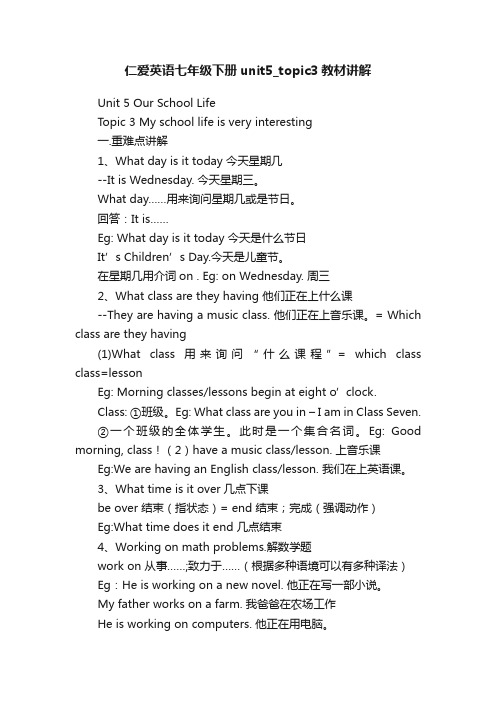
仁爱英语七年级下册unit5_topic3教材讲解Unit 5 Our School LifeTopic 3 My school life is very interesting一.重难点讲解1、What day is it today 今天星期几--It is Wednesday. 今天星期三。
What day……用来询问星期几或是节日。
回答:It is……Eg: What day is it today 今天是什么节日It’s Children’s Day.今天是儿童节。
在星期几用介词on . Eg: on Wednesday. 周三2、What class are they having 他们正在上什么课--They are having a music class. 他们正在上音乐课。
= Which class are they having(1)What class 用来询问“什么课程”= which class class=lessonEg: Morning classes/lessons begin at eight o’clock.Class: ①班级。
Eg: What class are you in – I am in Class Seven.②一个班级的全体学生。
此时是一个集合名词。
Eg: Good morning, class!(2)have a music class/lesson. 上音乐课Eg:We are having an English class/lesson. 我们在上英语课。
3、What time is it over几点下课be over 结束(指状态)= end 结束;完成(强调动作)Eg:What time does it end 几点结束4、Working on math problems.解数学题work on 从事……;致力于……(根据多种语境可以有多种译法)Eg:He is working on a new novel. 他正在写一部小说。
仁爱版英语七年级下册 Unit5_Topic3_SectionA教材知识详解
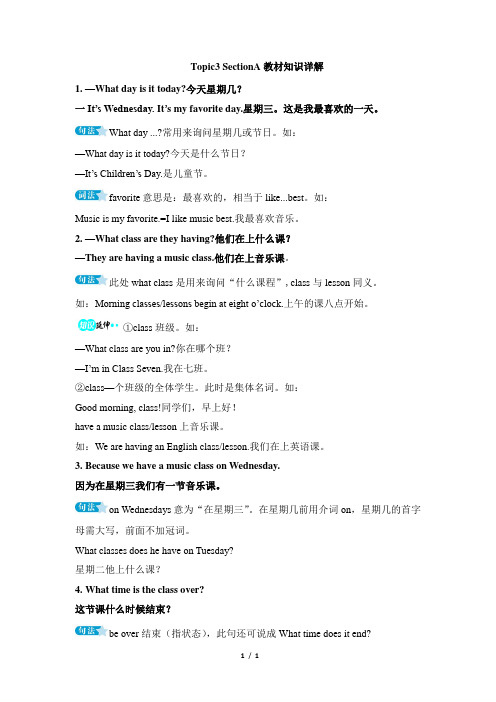
Topic3 SectionA教材知识详解1. —What day is it today?今天星期几?一It’s Wednesday. It’s my favorite day.星期三。
这是我最喜欢的一天。
What day ...?常用来询问星期几或节日。
如:—What day is it today?今天是什么节日?—It’s Children’s Day.是儿童节。
favorite意思是:最喜欢的,相当于like...best。
如:Music is my favorite.=I like music best.我最喜欢音乐。
2. —What class are they having?他们在上什么课?—They are having a music class.他们在上音乐课。
此处what class是用来询问“什么课程”,class与lesson同义。
如:Morning classes/lessons begin at eight o’clock.上午的课八点开始。
①class班级。
如:—What class are you in?你在哪个班?—I’m in Cla ss Seven.我在七班。
②class—个班级的全体学生。
此时是集体名词。
如:Good morning, class!同学们,早上好!have a music class/lesson上音乐课。
如:We are having an English class/lesson.我们在上英语课。
3.Because we have a music class on Wednesday.因为在星期三我们有一节音乐课。
on Wednesdays意为“在星期三”。
在星期几前用介词on,星期几的首字母需大写,前面不加冠词。
What classes does he have on Tuesday?星期二他上什么课?4.What time is the class over?这节课什么时候结束?be over结束(指状态),此句还可说成What time does it end?1 / 1。
Unit 5 Topic 3 Section A(19页)仁爱版七年级下册英语课件
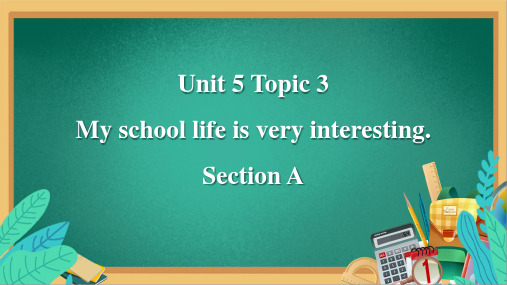
We can: 1. talk about the other subjects. e.g. chemistry(化学), economics(经济学) law(法学)
2. My father is very busy. He has little time to play _g_am__e_s_(game) with me. 3.Look ! Some students ___ar_e_h_a_v_i_n_g__(have) lesson in the classroom now. 4.__ _A_r_e___ you_s_i_tt_in_g____(sit) in the lab?
What day is it today?
It's Sunday.
A: What day is it today? B: It’s…
week 周、星期
This is a week. Sunday星期日 Monday星期一 Tuesday星期二 Wednesday星期三 Thursday星期四 Friday星期五 Saturday星期六
2. talk about the days. e.g. A: What day is it today? B: It’s Monday.
用括号内所给词的适当形式填空
1. __ Look ! Kangkang is here. __ Yes, he __i_s_d_r_aw__in_g___ (draw) pictures.
Politics Chinese
History Biology
Art
仁爱版七年级下册 Unit 5 Topic 3 课文翻译

仁爱英语七年级下册Unit 5 Our School Life 我们的校园生活Topic 3 My school life is very interesting.我的校园生活很有趣。
Section A1aWhat day is it today?今天是星期几?Wednesday,it 's my favorite day.星期三。
这是我最喜欢的日子。
Why?为什么?Because we have a music class on wednesday.因为在星期三我们有一节音乐课。
I like it very much.我非常喜欢音乐课。
Listen,what class are they having?听!他们正上什么课?They are having a music class.他们正上音乐课。
No,I think they are having an English class.不,我想他们在上英语课。
You are right.你说的对。
What time is the class over?这节课什么时候结束?At twenty to elven.十点四十。
What time does the next class begin?下一节课什么时候开始?At ten fifty.十点五十。
Section B1aZhou Yan: What book are you reading,Maria?周燕:你在看什么书,玛丽亚?Maria: I’m reading an English book.玛利亚:我在看英语书。
Zhou Yan: I think you must like english very much.周燕:我想你一定非常喜欢英语吧。
Maria: Yes. It’s easy and interesting? What do you think of it?玛利亚:是的!它既容易又有趣。
- 1、下载文档前请自行甄别文档内容的完整性,平台不提供额外的编辑、内容补充、找答案等附加服务。
- 2、"仅部分预览"的文档,不可在线预览部分如存在完整性等问题,可反馈申请退款(可完整预览的文档不适用该条件!)。
- 3、如文档侵犯您的权益,请联系客服反馈,我们会尽快为您处理(人工客服工作时间:9:00-18:30)。
仁爱版七年级英语下册unit5topic3教材讲解第一篇:仁爱版七年级英语下册unit5 topic3教材讲解Unit 5 Our School Life Topic 3 My school life is very interesting 一.重难点讲解1、What day is it today? 今天星期几?--It is Wednesday.今天星期三。
What day……?用来询问星期几或是节日。
回答:It is……Eg: What day is it today? 今天是什么节日?It’s Children’s Day.今天是儿童节。
在星期几用介词 on.Eg: on Wednesday.周三2、What class are they having? 他们正在上什么课?--They are having a music class.他们正在上音乐课。
= Which class are they having?(1)What class 用来询问“什么课程”= which classclass=lessonEg: Morning classes/lessons begin at eight o’clock.Class: ①班级。
Eg: What class are you in? –I am in Class Seven.②一个班级的全体学生。
此时是一个集合名词。
Eg: Good morning, class!(2)have a music class/lesson.上音乐课Eg:We are having an English class/lesson.我们在上英语课。
3、What time is it over?几点下课?be over 结束(指状态)= end 结束;完成(强调动作)Eg:What time does it end? 几点结束?4、Working on math problems.解数学题work on 从事……;致力于……(根据多种语境可以有多种译法)Eg:He is working on a new novel.他正在写一部小说。
My father works on a farm.我爸爸在农场工作He is working on computers.他正在用电脑。
He is outside and working on the car..他在外边修汽车。
work out 算出;计算。
Eg: The little boy can work out the math problem all by him self.这个小男孩能自己算出这道数学题。
5、They are learing about the past in the class.他们在课堂上了解过去。
(1)learn about 了解We learn English ,but we don’t learn about English.我们学习英语但我们不了解英语。
(2)learn = study学习(但learn 侧重于强调学习的成果“学会,学到“学习具体的事情要用learn, 如: learn English ;study 还有钻研,研究的意思,表示研究性的学习,强调学习的过程)Eg: They are studying history.learn to do sth 学做某事Eg:let’s learn to speak English.6、You must like English very much.你一定非常喜欢英语。
must 表肯定的猜测。
“一定……”Eg: That book must be Jane’s, because her name is on it.那本书一定是简的,因为她的名字在上面。
can’t be “不可能……”表否定的猜测Eg: That bike over there can’t be Jane’s,Hers is new.那边的自行车不可能是简的。
她的是新的。
7、What do you think of it? 你认为它怎样?--Sometimes it’s difficult and boring , so I don’t like it very much.有时难学且乏味,所以我不太喜欢(1)What do you think of ……? 你认为……怎么样?(表示主人对某人或某物的看法)可用how do you like……? 此句还有询问对某物的喜欢程度Eg: What do you think of the book? 你觉得这本书怎样?---It is very intersting.非常有趣。
=How do you like the book?How do you like China? 你有多喜欢中国。
---Very much.非常喜欢。
(2)very much = a lot“非常”表程度Eg: I like playing basketball very much.= I like playing basketball a lot.8、What’s your favorite subject? 你最喜欢什么科目?=Which subject do you like best? what’s one’s favorite ……?=which …… do/does sb like best? 某人最喜欢什么?What’s your favorite sport?= Which sport do you like best?9、Why don’t you like it?你问什么不喜欢它?Why don’t you +动词原形?“你为什么不…….?”此句型还可以用来提出建议,= why not…..? “为何不……呢?”E g: Why don’t you play soccer with us? = Why not play soccer with us?为何不跟我们一起去踢球呢?10、At school , my tearchers and classmates are very friendly to me.在学校,我的老师和同学对我很友好。
be friendly to sd.对某人友好friendly 在此为形容词“友好的,友善的” = kindEg: Everyone here is very friendly to us.这里的每个人对我们都很友好。
= Everyone here is very kind to us.11、I study Chinese,English,politics,art,history,geography,biology and some other subjects.我学习语文,英语,政治,美术,历史,地理,生物和一些其他的课程。
(1)当指在学校学习各门功课时study=learn Learn ①通过练习或教师指导而记住或学会;I’m learning to skate.我在学滑冰。
②向某人学习,从……中学习We should learn from each other.我们应该相互学习。
③教与学并提Men learn while they teach.教学相长。
Study 指用功学,钻研,研究Eg:He always studies math.他总是学习数学。
(2)other 形容词,“另外的,其他的”表示泛指,常与名词复数和不可数名词连用。
Eg:I see John with some other boys.我看见约翰和其他一些男孩在一起。
如果other 前有the,this,any,each,every,no,none以及形容词性物主代词时,后面只加单数名词。
Eg:I have no other place to go.我没有地方可去。
① the other 表示两者中的另外一个,可单独使用也可接单数名词。
Eg: He has two pencils.One is short,the other is long.他有两只铅笔,一只是短的,另外一只是长的。
② others 是other的复数形式,意为‘别的人或物’,表示泛指。
如:If you work hard.you will catch up with others soon.如果你努力学习,你很快会赶上别人的。
12、Attention,please!Here is the news.请注意,这儿有消息告诉大家。
① Attention,please!是书面或口头通知的常用语,目的在于提醒别人注意。
② News意为“消息,新闻”是不可数名词。
Eg: a piece of news 一则新闻或消息。
What’s the latest news?有什么新消息吗?13、There is a soccer game between Class One and Class Two on the playground at 5:00 this afternoon.今天下午五点,一班和二班将在操场上举行一场足球赛。
Between是介词,意为“在……之间”,一般指两者之间。
Between…and…是介词短语,意为“在……和……..之间。
Eg: The chair is between the bed and the desk.那张椅子在床铺好桌子之间。
(1)指三者或三者以上的人或物中每两者之间,仍用between.Eg: She takes some medicine between three meals every day.她每天在两餐之间吃药。
(2)当涉及边界时指两个以上国家之间Eg: Switzerland is between France,Italy,Austria and Germany.瑞士位于法国,意大利,奥地利及德国之间。
14、Do you want to see the stamps of the world? 你想看看世界邮票吗?World 名词,“世界”All over the world = around the world 全世界15、speak English = say ……in English 用英语说……Eg: My sister can’t speak English.我的妹妹不会讲英语。
My sister can’t say the pen in English.我的妹妹不会用英语讲钢笔。
16、Thank you for your hard work!谢谢你的努力工作。
(1)thank you / thanks for sth/doing sth.为某事或坐某事而感谢。
